I think now, looking back, we did not fight the enemy; we fought ourselves. The enemy was in us. The war is over for me now, but it will always be there, the rest of my days. As I’m sure Elias will be, fighting with Barnes for what Rhah called “possession of my soul.” There are times since, I’ve felt like a child, born of those two fathers.
–
Oliver StoneCharlie Taylor meditates on Vietnam
I honestly think that Platoon might be my favourite war film ever made. It’s almost certainly my favourite Vietnam film ever made, despite my considerable respect for Apocalypse Now. However, though Stone’s classic is steeped in allegory and metaphor (see the above quote), I think that it works better as a personal account of the conflict, rather than Coppola’s attempt to capture the surreal nature of the war on celluloid. Stone actually served a tour over there, and I think that there’s a lot of his own personal perspective poured into the film, which makes it feel like quite a raw and powerful piece of cinema.
Platoon is never subtle. It’s nuanced and carefully constructed, observed through the eyes of somebody who lived through the insanity, but it doesn’t ever pull its punches, and it doesn’t shade its world too much in tones of grey. Telling the story of Charles Taylor during his service in the war, the movie makes it clear that it is documenting the conflict between man’s better nature and his baser, primal instincts. It doesn’t suggest that one wins over the other, but it frames the “civil war” inside Taylor’s platoon along those lines. There is good, as personified by Sergeant Elias, and there is evil, as personified by Sergeant Barnes.
The film makes it clear that the line is drawn and that there’s no moral ambiguity. Elias rushes in to stop Barnes executing civilians. Elias cares for the new recruits and hopes to see them survive, while Barnes treats them like an albatross around his neck. Elias enjoys a little bit of peyote and spiritual meditation on the nature of the universe with his colleagues, while Barnes surrounds himself with sycophants, psychopaths and racists. While Elias is painted as almost divine, Barnes has a big ugly scar down the side of his face. There’s even a big Confederate flag on display on one of his friends’ bunk, in case you didn’t get it. Nobody could accuse the movie of being obtuse, but I think that’s why it works. The line that Charles Taylor must walk between the two Sergeants is clearly drawn, but the movie never pretends it’s easy to walk.
In fairness to Stone and to Berenger’s portrayal of Barnes, the movie doesn’t necessarily blame Barnes for his actions or his attitudes. Unlike the psychotic Bunny, the rapist and murderer played by Matt Dillon, Barnes arguably has some justification for his actions. He seems to act out of what he believes is the best interests of his men. He keeps the new recruits out of his squadron to increase the odds of survival for the men under him. When he starts executing civilians, he believes he’s trying to get an enemy to confess vital intelligence. Indeed, he even commits cold-blooded murder because he believes that the unit cannot function divided, and that due process doesn’t work in the jungle (“ain’t got no time for a court room out here”).
Indeed, after an especially brutal and horrible act, Barnes acknowledges that he has created some discontent. He confronts those officers who might plot against him, and offers them a chance to let their aggression out. “Oh, you wanna kick ass,” he taunts them. “Yeah. Well, here I am, all by my lonesome. And there ain’t nobody gonna know. Six of you boys against me. Kill me.” For Barnes, the biggest issue is one of survival – he believes that he can survive the war if does unspeakable things, and those who follow him will survive as well. Perhaps that’s how he rationalises his horrible actions.
So he insists that the soldiers under him submit their wills and morality to his own. He dismisses his victim “a crusader. Now, I got no fight… with any man who does what he’s told. But when he don’t, the machine breaks down. And when the machine breaks down, we break down. And I ain’t gonna allow that… in any of you. Not one.” He sounds remarkably like those “hallow men” that Kurtz spoke about in Coppola’s Apocalypse Now, a man who can rationalise impossibly horrible actions as part of his military training.
The problem with Barnes, apart from the actions he commits himself in service of his goals, is that his darkness infects and corrodes. It’s no coincidence that Stone takes care to populate the bunks of his followers with items like the Confederate Flag, and display most of his colleagues as racists and cowards. The evil that men can rationalise is truly terrifying, and it festers in soldiers like Bunny, who are more than willing to smash a civilian’s skull open or participate in a group-rape of a young girl. That sequence in the village is one of the most disturbing I ever recall seeing, despite the fact that it isn’t necessarily graphic. It’s distinctly unpleasant and uncomfortable, precisely because the participants in the violence are so casual about it.
It’s telling that, in contrast to the humanity and rationality of Barnes’ evil, the good in Elias is presented as almost supernatural. In fact, I honestly have difficulty believing that Willem Dafoe was cast as Elias before he played Jesus in The Last Temptation of the Christ. Barnes can attempt to justify his violence and rationalise away murder after murder, but Elias seems almost divine in his temperance and his faith and, strangely enough, his humanity. It’s telling that basic human decency was so hard to come by in Vietnam that Elias ends up looking like Jesus Christ.
He’s introduced carrying his rifle like Jesus carried his cross. There’s that famous sequence that even people who haven’t seen the movie know, with Elias reaching out his hands to heaven. “Guy’s in three years,” one character observes, “he thinks he’s Jesus f**kin’ Christ or something.” Barnes dismisses Elias as “a water-walker.” Again, if not for the fact that Dafoe actually played Jesus Christ, the symbolism might seem a little heavy-handed. Fortunately, the performances and direction are good enough that it never overwhelms the film.
In the middle is Charles Taylor, a character so clearly an all-American stand-in that he even narrates the movie through letters home to his dear old grandma. Taylor is a young kid who dropped out of college out of some misplaced ideal, and some wonderful optimism about how things really should be. Stone does a wonderful job of illustrating just how compromised Taylor ends up, but there’s something genuinely touching in the observation that Taylor makes about the people who have lived through the horror. “Those of us who did make it have an obligation to build again. To teach to others what we know, and to try with what’s left of our lives to find a goodness and a meaning to this life.” It’s actually a cautiously optimistic and warmingly humanist note for Stone, without ever shying away from the atrocities that occurred.
Stone’s Vietnam is a very dark place. It never feels ethereal or unreal, or abstract. It’s very clearly an actual place, even if the movie is intentionally ambiguous about where it is staged (“somewhere near the Cambodian Border”). There’s a sense that Stone isn’t elevating any of the absurdity of the place, but is simply laying it all out without any attempt to embellish or develop – the truth is crazy enough without adding a heightened sense of the surreal. So there are some stunning moments, like an early VC attack where the enemy seems to emerge from the jungle, or a later sequence where Barnes points out the bunker literally right in front of Taylor, only for the latter to ask, “Where?”And only then do we and Taylor actually see it.
Stone manages to make these scenes really work, and drip with tension, without ever seeming like he’s being manipulative or overwhelming. “This is spooky,” an officer observes of an abandoned VC camp, and it truly is – despite the fact that Stone films the surroundings in a relatively straight-forward manner, rather than using tricks to build a sense of heightened suspense. Instead, he just lays it all in front of his audience.
The same is true of the movie’s handling of the command struggle within the platoon under Lt. Wolfe. It’s fairly obvious that things are falling apart (“I think in front of the men, it’s necessary for me to give the orders,” the commanding officer tells Barnes, his subordinate), but it never feels like Stone is pushing anything into the realm of absurdity. It feels organic, it feels real, it doesn’t feel sensationalised. Apparently, his portrayal of Wolfe is so good that the U.S. military actually uses it as an example of how not to lead a platoon, as the officer seems to give in near the end of the movie, passively indifferent to how anything plays out. Pointing out that the base isn’t defended, Wolfe’s only response is, “You get new men any day. Until then, you make do, like everybody else.”
There are, of course, moments which transcend this wonderful toned down approach, and I think they are even more powerful for being relatively isolated in the context of the narrative. In particular, there is one absolutely stunning sequence, scored to Samuel Barber’s wonderful Adagio for Strings, as a soldier flees through the trees, wounded but alive. It’s a moment which is, for me at least, one of those “iconic” and “defining” cinematic moments. It’s up there with ET’s glowing finger, or the opening sequence of The Godfather. It is one of those moments which I filter through my memory whenever I think of anything remotely associated with the film. It’s just powerful stuff, to be absolutely frank.
Platoon is probably on the shortlist of my favourite movies of all time. I think it’s the very best movie that Oliver Stone ever made, and it’s certainly the best central performance that Charlie Sheen has ever given. It’s just so incredibly raw and powerful, a movie which really works for taking a simply but effective approach to its subject matter, but without dumbing down. I’ll concede that it is heavy-handed in certain respects (the Jesus imagery, for instance), but it’s a case where the cast and crew make it work in context.
I think it helps that it’s one of the few war movies that retains a core optimism about the human condition, even amid the horror. It acknowledges, as most do, that we are impossibly cruel creatures capable of incredible inhumanity, but its central idea is that perhaps we can overcome those demons and can learn from facing them. It isn’t as simple or straight-forward as the belief that good will win in a clean fight against evil, but perhaps we are strong enough to claw ourselves away from the abyss. Because the abyss is a truly terrifying place.
Filed under: Non-Review Reviews | Tagged: Charles Taylor, films, history, Jesus, Jesus Christ, military, Movies, non-review review, oliver stone, Platoon, review, tom berenger, vietnam, Vietnam War, willem dafoe |















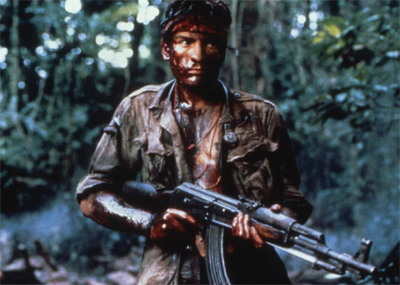

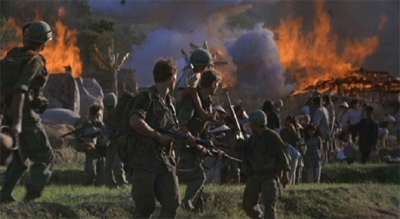
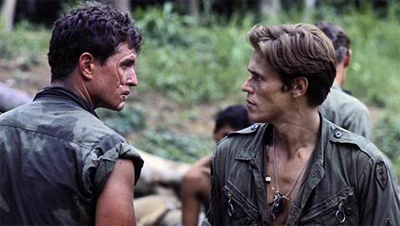
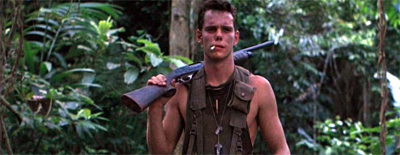
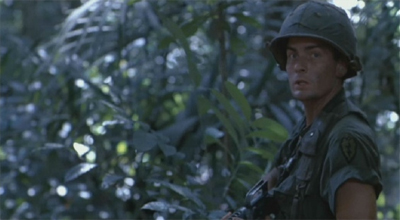
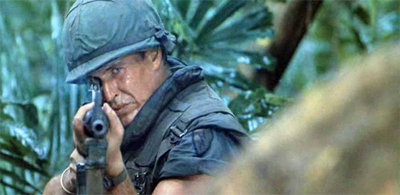
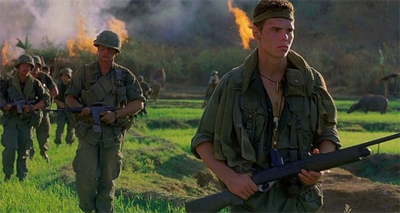





A: This post is amazing. *Really* thoughtful analysis of what makes this film so special and what makes it stick with the viewer long after it’s over.
B: Read an article in GQ a while back about Charlie. It suggests that part of the reason he became such a wild child was because he got so much so fast.
Between this and WALL STREET he starred in two high profile prestige pictures amazingly early in his career. He was lauded critically bs poised to be for Stone what DiNiro was for Scorsese. But when Stone passed him over for Cruise on FOURTH, it threw him for a loop and he never recovered. Thoughts?
Thanks man, really.
Do we know why Stone passed on him, if he seemed to take it so personally? I would have thought, pre-Hot Shots, the world was his oyster and he’d have had the pick of roles. It’s interesting to imagine how things might have gone.
Near-perfect war epic with great performances from the whole cast, but a great direction from Oliver Stone who takes this traditional war story, and puts his on style-spin on it. Good Review!
Thanks!